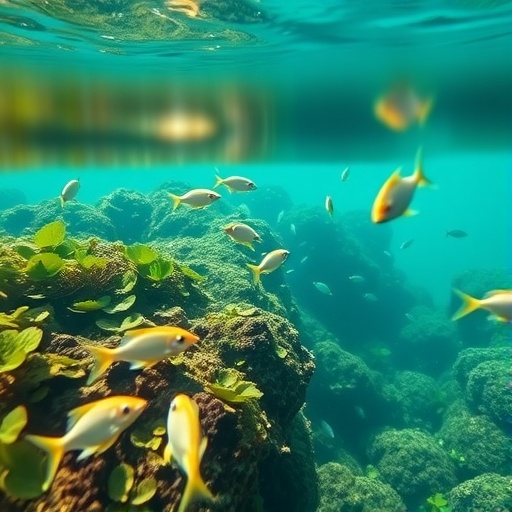As global demands for sustainable seafood surge, the aquaculture industry faces mounting pressure to balance productivity with environmental stewardship. Barramundi, a favored species in both China and Australia, has emerged as a central focus in this quest for responsible farming methods. Recent research spearheaded by Flinders University in collaboration with Chinese marine science institutions has explored the intricate role of herbal plant extracts as natural additives in aquaculture feed. This pioneering study delves into the immunostimulatory potential of these botanical compounds and their broader ecotoxicological implications, illuminating the path toward antibiotic-free and environmentally conscious fish farming.
Aquaculture, while poised to meet the nutritional needs of growing populations, confronts challenges such as disease outbreaks and reliance on chemical antibiotics, which risk fostering resistant pathogens and disturbing aquatic ecosystems. Addressing these issues, Professor Jian Qin from Flinders University highlights the urgent need to innovate feed formulations that can enhance fish immunity without compromising marine biodiversity. By integrating herbal extracts known for their medicinal properties, researchers aim to promote fish health during vulnerable developmental phases, especially the juvenile stage when barramundi are most susceptible to infections.
The study focused on four distinct plant species: gallnuts (Rhus chinensis), green chiretta (Andrographis paniculata), white mustard (Sinapis alba), and betel nut (Areca catechu). Each of these botanicals contains bioactive compounds such as phenols, terpenoids, alkaloids, and organosulfides, which are well-documented for their antimicrobial and antiparasitic effects. These natural substances offer a promising alternative to conventional antibiotics, potentially mitigating chemical residues in farmed fish and limiting environmental contamination.
However, while the benefits of these extracts in bolstering fish immune responses were evident, the interdisciplinary team led by Flinders PhD candidate Zhengyi Fu adopted a rigorous approach to assess their environmental safety. Experimental trials extended beyond juvenile barramundi to include brine shrimps (Artemia salina) and other marine species commonly found in aquaculture environments. This holistic evaluation aimed to elucidate any adverse physiological or toxicological effects that could ripple through the aquatic food web, thereby ensuring that the adoption of herbal additives does not inadvertently jeopardize ecosystem integrity.
The resulting data revealed nuanced interactions. Although most plant extracts demonstrated low ecotoxicity and contributed positively to biochemical markers indicative of immune health in juvenile fish, caution remains warranted. Some bioactive chemicals exhibited potential toxicity under certain exposure conditions, underscoring the complexity of deploying botanical compounds in dynamic marine settings. These findings prompt a critical reevaluation of feed additive concentrations and formulations to optimize benefits while minimizing ecological risks.
Professor Zhenhua Ma, director of the Tropical Fisheries Research and Development Centre in South China Sea Fisheries Research Institute, emphasized the dual responsibility of aquaculture innovation. “While plant extracts present exciting opportunities as sustainable feed additives, we must remain vigilant about their broader environmental impacts,” he stated. This sentiment echoes a growing consensus among marine scientists advocating for integrated risk assessments that holistically consider aquatic organism health, environmental persistence of bioactive substances, and the cumulative effects on biodiversity.
The methodology employed combined controlled laboratory experiments with biochemical assays measuring immune-related parameters, such as lysozyme activity, superoxide dismutase levels, and total antioxidant capacity in juvenile barramundi. These markers serve as reliable indicators of enhanced immunocompetence, reflecting improved resistance to pathogenic challenges. Concurrently, toxicological effects on non-target organisms were assessed through mortality rates, behavioral observations, and physiological stress responses, ensuring a comprehensive understanding of additive safety.
Publication in the prestigious journal Ecological Indicators signifies the study’s contribution to the field of aquaculture ecology and environmental monitoring. By bridging immunology, toxicology, and sustainable agriculture, the research embodies an integrative framework essential for future aquaculture innovations. The article titled “Evaluation of plant extracts as aquaculture feed additives: Ecotoxicological and physiological responses in marine species” advances critical knowledge, guiding policymakers, feed manufacturers, and aquatic farmers toward more informed decisions.
An important aspect of this research lies in its commitment to antibiotic-free aquaculture production, a global priority given rising concerns over antimicrobial resistance (AMR). Herbal extracts serve as viable immunostimulants, promoting innate defense mechanisms in fish without resorting to drugs that may compromise public health. Furthermore, enhancing the resilience of farmed species like barramundi aids in reducing disease outbreaks, which often precipitate the excessive use of chemical treatments detrimental to surrounding environments.
The broader ecological context must be considered. As aquaculture expands, the discharge of feed additives and their metabolites into marine habitats demands careful scrutiny. Even low concentrations of bioactive plant compounds can modulate microbial communities, alter benthic organisms, and trigger unforeseen ecosystem shifts. Hence, the ongoing research led by Flinders University and its Chinese partners represents a foundational step toward balancing aquaculture’s productivity with marine ecosystem conservation.
Beyond the immediate findings, this study prompts future investigations into the synergistic effects of multi-plant extract formulations and long-term exposure outcomes across diverse marine species. It invites exploration into optimized extraction methods, dosage regimens, and delivery mechanisms tailored to various aquaculture species and environmental conditions. Ultimately, this line of research could revolutionize feed practices, fostering resilience and sustainability.
In conclusion, the emerging application of herbal additives in barramundi aquaculture stands at the intersection of tradition and modern science—leveraging ancient botanical wisdom through contemporary experimental rigor. While preliminary results are encouraging for fish health and sustainable farming, thorough environmental risk evaluations remain indispensable. Together, these insights offer a pathway toward a sustainable aquaculture paradigm that simultaneously champions food security, ecological integrity, and a reduced chemical footprint.
Subject of Research: Animals
Article Title: Evaluation of plant extracts as aquaculture feed additives: Ecotoxicological and physiological responses in marine species
News Publication Date: 30-Jul-2025
Web References:
https://doi.org/10.1016/j.ecolind.2025.113964
https://www.sciencedirect.com/science/article/pii/S1470160X25008945
References:
Fu, Z., Zhang, T., Ma, Z., & Qin, J.G. (2025). Evaluation of plant extracts as aquaculture feed additives: Ecotoxicological and physiological responses in marine species. Ecological Indicators. DOI: 10.1016/j.ecolind.2025.113964
Image Credits: Flinders University
Keywords: aquaculture, barramundi, herbal additives, plant extracts, immunostimulants, ecotoxicology, antibiotic-free farming, sustainable aquaculture, Rhus chinensis, Andrographis paniculata, Sinapis alba, Areca catechu, marine species, fish immunity




